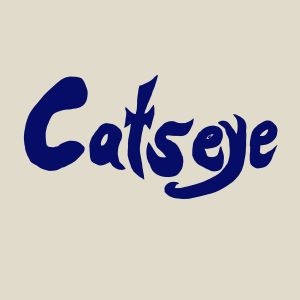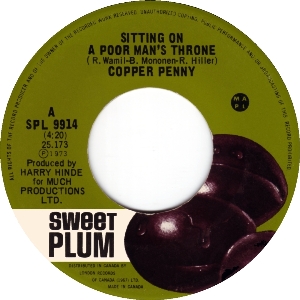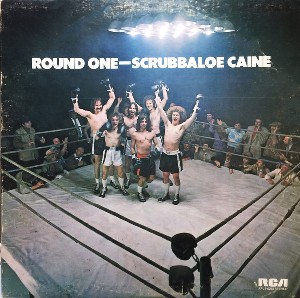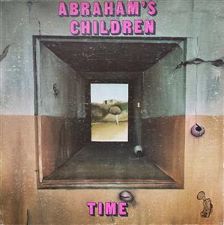| |
Catseye

Catseye
Voluntary In Nature - 1973
Michael Panontin
|
Everyone loves to boast about their greatest record finds. It might be an album you picked up while digging through a thrift shop for a few cents that is worth hundreds, or if you're lucky thousands, of dollars. Or maybe even a box of unsold singles languishing in the dusty corner of some basement or warehouse. (My own personal triumph happens to be a near-mint copy of Reign Ghost's first LP that I bought for a fiver in the early eighties at a used record shop in Windsor, ON.)
But perhaps the most fascinating tales are those that involve records that few knew even existed. I doubt there will ever be a story to top Warrens Hill's discovery of a hitherto unknown Velvet Underground acetate sandwiched in a box of water-damaged albums on the streets of lower Manhattan, a 25-cent purchase that ultimately fetched over $25,000.
Canada has its own equally fascinating lore, like DJ Kobal's unearthing of Henri-Pierre Noel's long-forgotten compas-jazz collection Piano in a Montreal flea market, or the discovery of a privately pressed Xian psych LP called Troubled by the totally unknown Vancouver group the New Creation. And then of course there is the delightful tale of Catseye and its eight-year odyssey from thrift shop to digital - and upcoming vinyl - reissue.
The trippy folk LP first found its way into the hands of Kevin Howes in 2014 in the most unlikely of places. "I was en route to Winnipeg in my old Toyota Corolla. I stopped at this rural Alberta thrift store and found a record in a plain white sleeve," the music historian explained to the CBC. It had a scuffed-up cover with the word 'Catseye' hand-written across it. He purchased the record - for a quarter! - and took it back to his hotel room to give it a spin on his portable record player. "I was just flabbergasted at what I was hearing," he recalled. "This was a really personal, progressive folk album from the early seventies."
In the songwriting credits was the name 'O'Kane', and since the record had been pressed in the UK, Howes assumed it must have been recorded by some British singer-songwriter. He scoured the internet and reached out to his overseas contacts, but to no avail. There was literally nothing out there on either Catseye or the mysterious Mr. O'Kane.
The case was essentially a cold one for a good five years...that is until Howes decided to email a little-known Vancouver singer-songwriter. "This is crazy. What are you talking about? Yes, I'm Duane O'Kane. And yes, I did that record," was the response, with the musician incredulously adding, "I thought it was just some wacko, frankly."
The seeds of Catseye began to germinate in the fall of 1972. O'Kane was travelling by train through the Rockies and met up with a Brit named Colin Brown, who was strumming a guitar and entertaining his fellow passengers (with a solo version of 'Nights in White Satin', no less). The pair reconnected in Vancouver, and by the spring of '73, O'Kane, Brown and Lorraine Pilling had moved to the UK, where they were joined by instrumentalist Jose Gross.
London can be a tough nut to crack. But O'Kane managed to set up some recording time with an ex-BBC employee who owned an old Pye Records studio board and a Revox 2-track reel-to-reel deck. With 99 demo copies pressed up, O'Kane shopped the record around to local A&R reps and record labels. One even found its way into the hands of radio legend John Peel, who actually rang up the group's shared flat to sing the album's praises. From there the trajectory must have seemed almost straight up, as Catseye were hooked up with Elton John's newly created Rocket Record Company and sights were set on a proper release.
But things unfortunately began to unravel, as they so often do in the music world. Who knows what was going on with the folks at Rocket? The label had recently signed Aussie singer Kiki Dee and US teen idols the Hudson Brothers, which may have diverted their attention from a bunch of post-psychedelic folkies with little hit potential.
O'Kane had a different take on things. "I think it was a whole lot of ego that gets involved at that stage," he recalled, "when suddenly [there is] interest in the band and maybe everybody wants to be the leader and things change." In any case, it wasn't long before a homesick Pilling decided to quit the UK altogether and head back to Canada, with a no doubt equally frustrated O'Kane not far behind.
For O'Kane, what was once tinged in regret now feels like a late-in-life triumph. "One of the dumbest things I ever did was leaving London," he said. "But I was stunned at Kevin, his fortitude and commitment to this project...I was so, so profoundly touched."
|
|
Suggestions

Painter
West Coast Woman / Space Truck - 7"
Elektra

Copper Penny
Sitting on a Poor Man's Throne / Bad Manners - 7"
Sweet Plum

Scrubbaloe Caine
Round One
RCA

Abraham's Children
Time
G.A.S.
|








